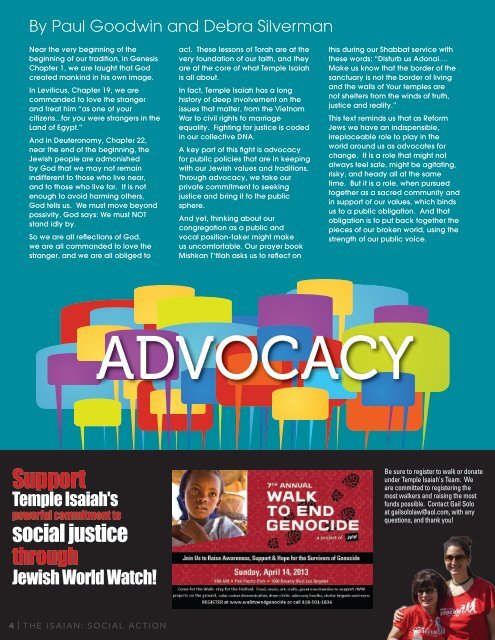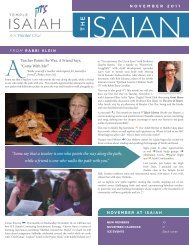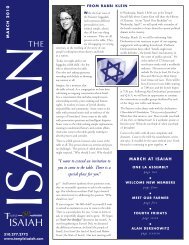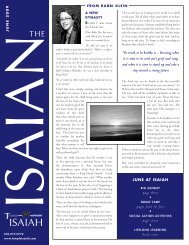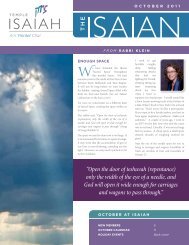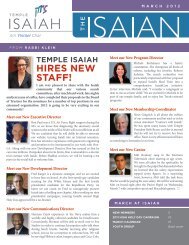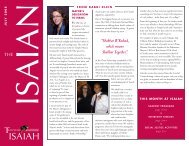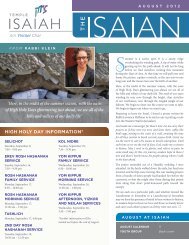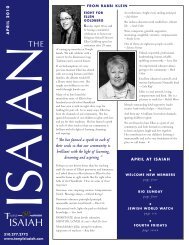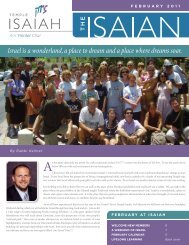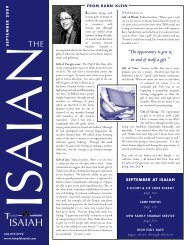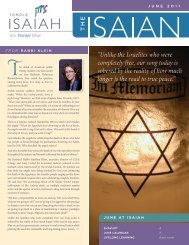You also want an ePaper? Increase the reach of your titles
YUMPU automatically turns print PDFs into web optimized ePapers that Google loves.
By Paul Goodwin and Debra Silverman<br />
Near the very beginning of the<br />
beginning of our tradition, in Genesis<br />
Chapter 1, we are taught that God<br />
created mankind in his own image.<br />
In Leviticus, Chapter 19, we are<br />
commanded to love the stranger<br />
and treat him “as one of your<br />
citizens...for you were strangers in the<br />
Land of Egypt.”<br />
And in Deuteronomy, Chapter 22,<br />
near the end of the beginning, the<br />
Jewish people are admonished<br />
by God that we may not remain<br />
indifferent to those who live near,<br />
and to those who live far. It is not<br />
enough to avoid harming others,<br />
God tells us. We must move beyond<br />
passivity, God says: We must NOT<br />
stand idly by.<br />
So we are all reflections of God,<br />
we are all commanded to love the<br />
stranger, and we are all obliged to<br />
act. These lessons of Torah are at the<br />
very foundation of our faith, and they<br />
are at the core of what <strong>Temple</strong> <strong>Isaiah</strong><br />
is all about.<br />
In fact, <strong>Temple</strong> <strong>Isaiah</strong> has a long<br />
history of deep involvement on the<br />
issues that matter, from the Vietnam<br />
War to civil rights to marriage<br />
equality. Fighting for justice is coded<br />
in our collective DNA.<br />
A key part of this fight is advocacy<br />
for public policies that are in keeping<br />
with our Jewish values and traditions.<br />
Through advocacy, we take our<br />
private commitment to seeking<br />
justice and bring it to the public<br />
sphere.<br />
And yet, thinking about our<br />
congregation as a public and<br />
vocal position-taker might make<br />
us uncomfortable. Our prayer book<br />
Mishkan T’filah asks us to reflect on<br />
this during our Shabbat service with<br />
these words: “Disturb us Adonai....<br />
Make us know that the border of the<br />
sanctuary is not the border of living<br />
and the walls of Your temples are<br />
not shelters from the winds of truth,<br />
justice and reality.”<br />
This text reminds us that as Reform<br />
Jews we have an indispensible,<br />
irreplaceable role to play in the<br />
world around us as advocates for<br />
change. It is a role that might not<br />
always feel safe, might be agitating,<br />
risky, and heady all at the same<br />
time. But it is a role, when pursued<br />
together as a sacred community and<br />
in support of our values, which binds<br />
us to a public obligation. And that<br />
obligation is to put back together the<br />
pieces of our broken world, using the<br />
strength of our public voice.<br />
Support<br />
<strong>Temple</strong> <strong>Isaiah</strong>'s<br />
powerful commitment to<br />
social justice<br />
through<br />
Jewish World Watch!<br />
Be sure to register to walk or donate<br />
under <strong>Temple</strong> <strong>Isaiah</strong>'s Team. We<br />
are committed to registering the<br />
most walkers and raising the most<br />
funds possible. Contact Gail Solo<br />
at gailsololaw@aol.com, with any<br />
questions, and thank you!<br />
4 | THE ISAIAN: SOCIAL ACTION<br />
APRIL 2013


